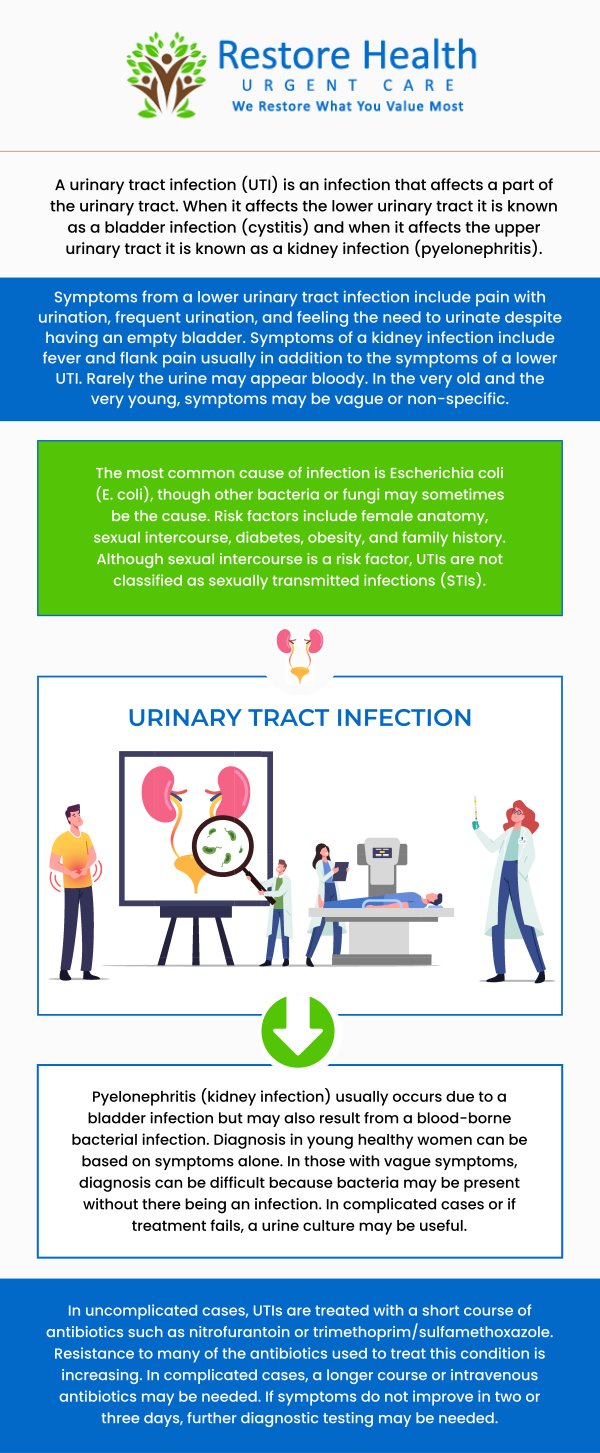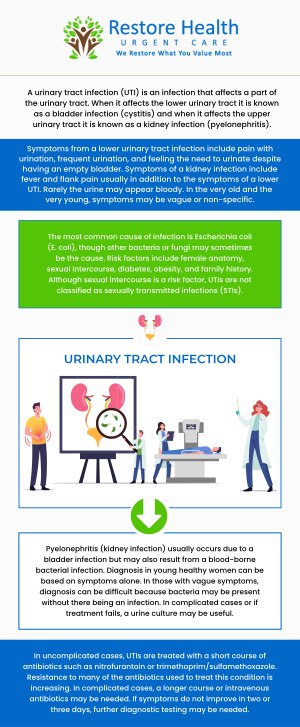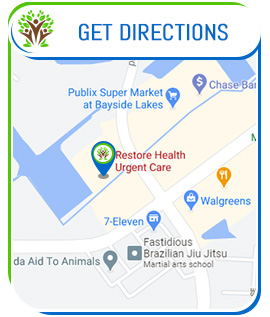Urinary Tract Infection Treatment Clinic in Palm Bay, FL
UTIs mainly develop when germs reach the urinary tract through the urethra and spreads to the bladder. Urinary Tract Infection (UTI) can be serious if not taken seriously and can cause more issues. At Restore Health Urgent Care our team of qualified doctors can diagnose and provide the best treatment for you. For more information, contact us today or visit us online to book an appointment. We are conveniently located at 1840 Eldron Blvd SE. Suite 1 Palm Bay, FL 32909.




Urinary Tract Infections
Urinary tract infections (UTIs) are infections that are in part or all of the system of organs that makes urine and carries it out of your body. Organs in this system are the kidneys, bladder and the tubes that connect them.
The bladder is where most urinary tract infections are. Bladder infections are typically not serious if treated immediately. Untreated UTIs can spread to your kidneys and cause serious and permanent damage. You can reach us in serious condition to learn more about our services and treatment options.
Untreated urinary tract infections can lead to more serious bladder infections and kidney infections.
Germs and Urinary Tract Infections
Most urinary tract infections are caused by germs getting into the system through your urethra, the tube that carries the urine from your bladder out of the body. The usual culprits are germs from the large intestines found in stool. If these germs get in your urethra, they travel up into your bladder and kidneys and cause infections. Women have shorter urethras than men, and there is a shorter distance from the urethra to the anus in women. This can make it easier for germs to travel to the bladder, which is probably why women have more UTIs than men. Sexual activity can also make it easier for germs to get into a woman’s urethra. Catheters (small, flexible tubes inserted into the bladder that allow urine to drain) are a common source of infection in people who use them.
People with diabetes or women who are pregnant are more likely to get urinary tract infections. Anything that blocks the flow of urine from your bladder can lead to increased opportunity for germs to grow, causing infections. Having kidney stones or an enlarged prostate gland can lead to more bladder infections. It is not completely understood why, but some women get bladder infections repeatedly.
Urinary Tract Infection Symptoms
Check for these symptoms to see if you have a urinary tract infection:
- Having to urinate often, but not much urine comes out each time
- Pain or burning with urination
- Pain in your lower abdomen
- Fever or chills
- Nausea or vomiting
- Cloudy, pink or red urine, or urine that smells bad
- Pain in your kidneys (under your ribs, on the side of your back)
When to See the Doctor
At our urgent care, our healthcare team can check if you think you have an infection and you have a fever, feel nauseous, are vomiting, have pain in your sides under your ribs, have diabetes, have kidney problems, or have a weak immune system. You should also see the doctor if you have any of these symptoms and you are older than 65 or are pregnant.
When you arrive at the office, the doctor will ask for a sample of your urine. The lab testing of urine is carried out to see if it has the germs that cause UTIs. If you have infections often, you may need extra testing to find out why.
A Note on Taking Your Antibiotics
Antibiotics will usually cure a bladder infection, and your doctor can prescribe what you need. It may help to drink lots of water and fluids and also to urinate often, emptying your bladder completely every time. When you are prescribed antibiotics, follow all instructions. If you stop taking them because you feel better, there is a very good chance that some infection still remains, and you are more likely to get sick again.
Preventing Urinary Tract Infections
Make sure you take all the time you need to empty your bladder completely when you urinate. Sexually active women should make a point of urinating shortly after having sex. Women past menopause who are having UTIs repeatedly may consider using a vaginal estrogen to help.
Healing From a Urinary Tract Infection
Urine tests and how much time is required to cure the infection will vary with the location of the infection. The frequency, and seriousness of the infection also affect the treatment and healing time. Kidney infections and UTIs that are accompanied my other complications require longer treatment.
Complications are not common but do occur. Serious complications can include permanent kidney damage and life-threatening widespread infection called sepsis. The risk for permanent damage or widespread infection is greater if the infection isn’t treated or if the infection does not respond to antibiotics.For more information, contact us today or visit us online to book an appointment. We are conveniently located at 1840 Eldron Blvd SE. Suite 1 Palm Bay, FL 32909. We serve patients from Palm Bay FL, Melbourne FL, Malabar FL, June Park FL, Grant-Valkaria FL, and surrounding areas. Walk-ins Welcome.
Additional Services You May Need



